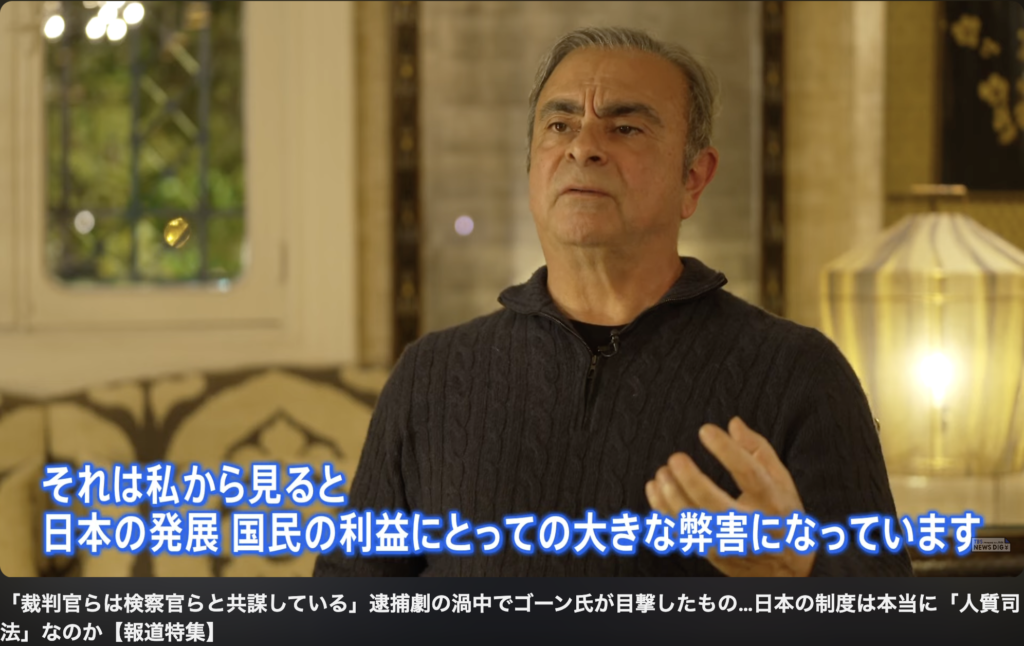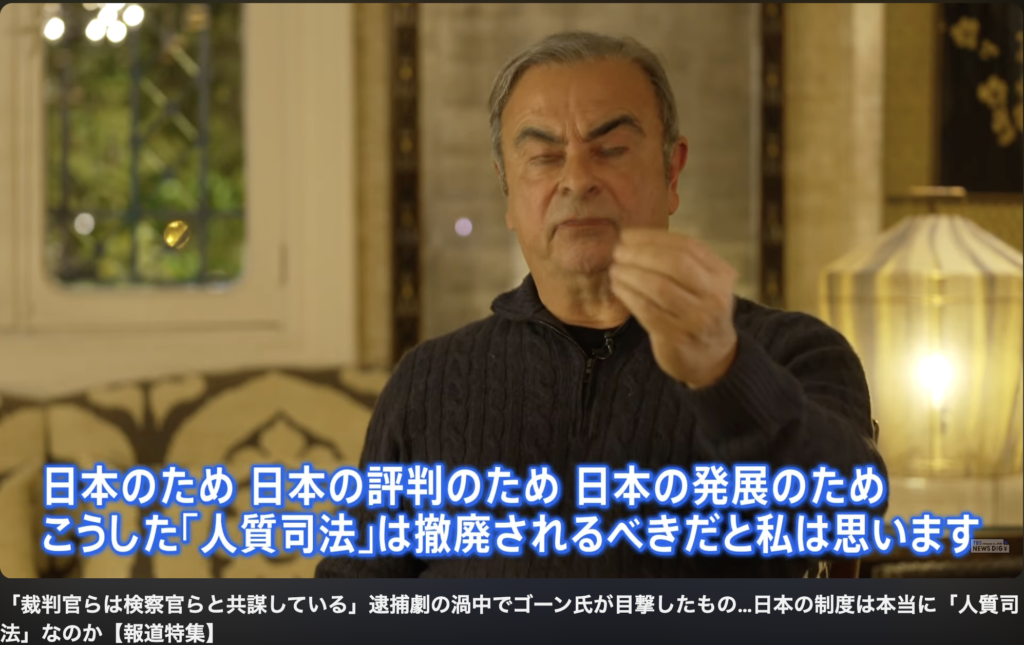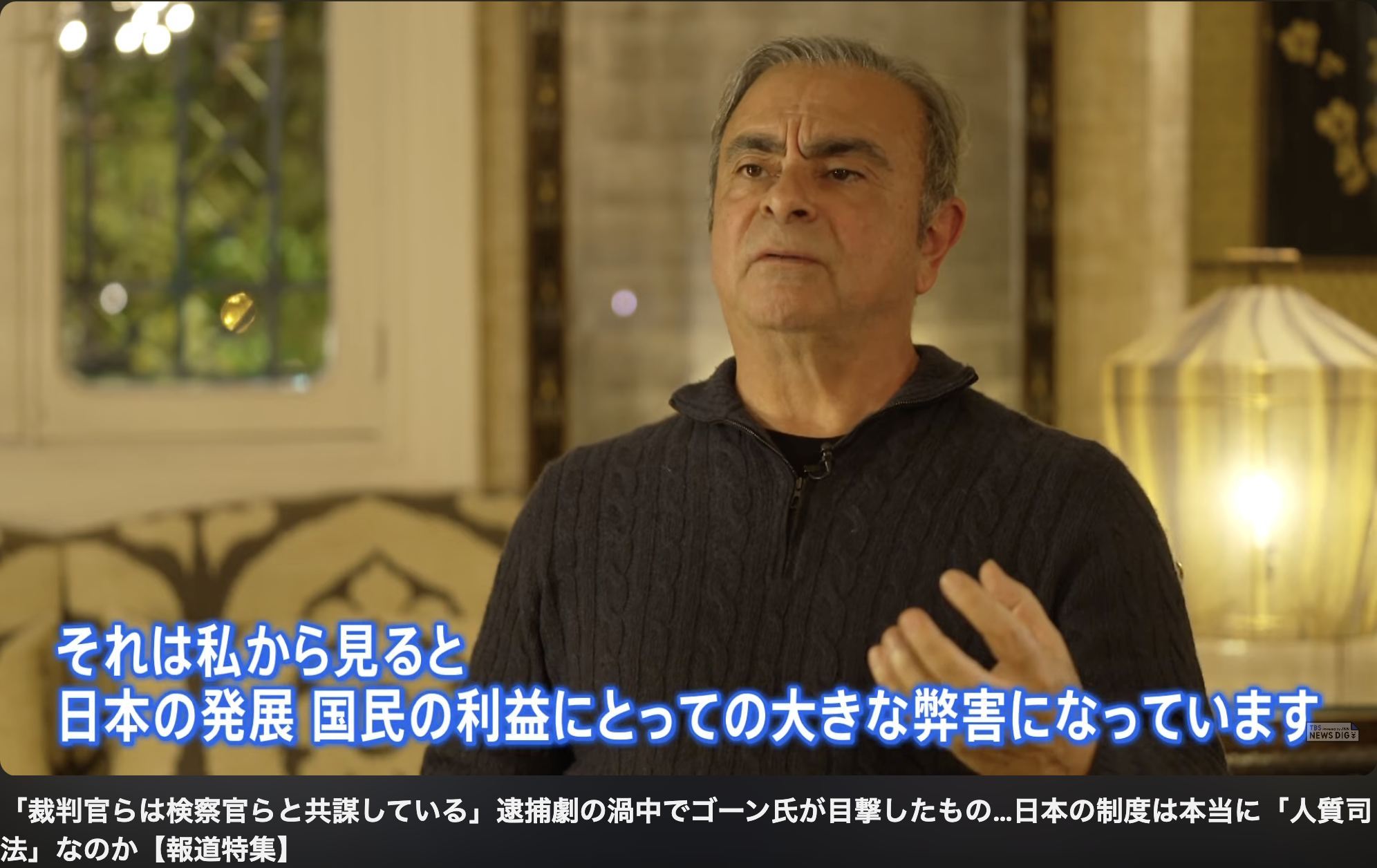Continuing from yesterday, this is the main point of the video. Ghosn claims that judges are merely accessories to prosecutors and asserts that they conspire together.
I think the ordinary Japanese public should demand to change the law which regulates the prosecutor and establish a system much more balanced between the prosecutor and the defense, and the defense lawyer. Not allow the system to work where if the prosecutor doesn’t have a win, it’s bad for his career, because the prosecutor is here to seek the truth, not to make a win, but to seek the truth for justice. That’s what’s asked of the prosecutor, to try to find if there is any reason to bring this in front of the judge.
So, my opinion is, you need to change the law. This can be changed by law. The Diet is under the responsibility of the people; people vote, and this, in my opinion, should be the object of a new law to regulate the prosecutor and change the hostage justice system. You have many lawyers fighting against the system for many, many years. They know what needs to be done. Just do it, just vote for it, and change the whole picture.
And it’s not only about foreigners and executives and companies. It’s for the good standing of every single citizen because you never know when you, as a citizen, will be involved in the hostage justice system, but then it is too late. Within the present law, you’re going to be a victim 100%.
From my experience, I don’t think judges conspire with prosecutors, but it seemed to me that they were too ready to accept what the prosecutors said without scrutiny.
I believe that the one-sided view held by the courts, which assumes that only suspects or defendants are capable of destroying evidence, is absolutely wrong. Prosecutors and police are also forms of power, and there are internal struggles. These struggles can sometimes become so intense that they even threaten a person’s life, and no one doubts this fact. The courts must conduct trials fairly, assuming that the possibility of evidence destruction and the motivation for it also exist on the side of the investigators.


Frankly, I’m not interested in Nissan cars, nor do I have any particular attachment to the company. However, I’ve always followed Nissan’s history with interest because it has paralleled my own life. The history of Nissan, a company that was driven to bankruptcy due to Japan’s conservative corporate management, has always fascinated me.
When I was in elementary school, there was the bubble economy. By the time I was in middle school, the bubble had burst, and a sense of decline was in the air. The image of “Japan as Number One” and “a leading industrial nation” had crumbled, and I first learned about the coming of the financial era through the late Taichi Sakaiya’s “Big Bang” financial theory. It was around this time, when I was in high school, that I heard the news of Nissan’s significant decline.
Amidst the various reports about potential mergers and even the company’s possible demise, a comet named Carlos Ghosn appeared in Japan. In just a few years, Nissan, to use Ghosn’s words, “revived.” He quickly became known as a strong cost-cutter, earning a reputation as a disliked figure, but to call him anything other than a savior would be completely misguided. He not only revived a company that was on the brink of collapse but also propelled it to the top ranks. Nissan’s lack of gratitude is evident in its betrayal of Ghosn, using the prosecutors to purge him after they had saved the company, only to then demand its return to Renault (or, in a sense, the French government).
As Ghosn said in his interview, he loved Japan and Nissan. He lived in Japan and dedicated himself to the country. While there may be claims that he “exploited Japan,” it’s hard to see how anyone could still think that after looking at his accomplishments. His right-hand man, Greg Kelly, who was in charge of the CEO’s office, was indicted, found guilty, and stated that he never wants to return to Japan. Yet, despite the treatment Ghosn received from Nissan and the Japanese judiciary, he still expresses concern for Japan.
Japanese people who continue to view Ghosn as guilty should realize that they have not yet escaped the media’s brainwashing. It is essential to separate the accusations against Ghosn, his escape, and the judicial system (hostage justice) and consider them thoroughly.
Lastly, there’s another interesting perspective in this interview. The interviewer, Shigenori Kanehira, asks questions from the viewpoint of the relationship between power and government. His journalistic work often focuses on monitoring power and exposing wrongdoing. During the Lockheed scandal, it was directed against the government, but now he is taking aim at the prosecutors who once targeted the government. This incident is reported from both the perspective of a coup orchestrated by Nissan executives involving the prosecutors, and an event where the prosecutors, having become a powerful force, dragged Nissan into the mess.
I am fully aware that both Kanehira and TBS have been criticized as leftist or unpatriotic, but it should be acknowledged that it is healthy journalism when a segment of Japan’s major media, which often cozies up to power, stands against it. The public should recognize this as well.
裁判官らは検察官らと共謀している – カルロスゴーン
昨日の続きだが、この動画のメインタイトルの話。彼は、裁判官は検察の付属品になっていると主張する。また、裁判官と検察は結託している(共謀している)と主張する。
I think the ordinary Japanese public should demand to change the law which regulates the prosecutor and establish a system much more balanced between the prosecutor and the defense, and the defense lawyer. Not allow the system to work where if the prosecutor doesn’t have a win, it’s bad for his career, because the prosecutor is here to seek the truth, not to make a win, but to seek the truth for justice. That’s what’s asked of the prosecutor, to try to find if there is any reason to bring this in front of the judge.
私は、日本の一般市民が検察官を規制する法律を改正し、検察と弁護側、そして弁護士の間でよりバランスの取れたシステムを確立することを求めるべきだと思います。現行のシステムでは、検察官が勝訴できなければそのキャリアに悪影響が出るという状況を許してはなりません。なぜなら、検察官は真実を追求するために存在するのであって、勝訴するためだけではなく、正義のために真実を追求することが求められているからです。検察官の仕事は、この件を裁判官の前に持ち込む理由があるかどうかを見極めることです。
So, my opinion is, you need to change the law. This can be changed by law. The Diet is under the responsibility of the people; people vote, and this, in my opinion, should be the object of a new law to regulate the prosecutor and change the hostage justice system. You have many lawyers fighting against the system for many, many years. They know what needs to be done. Just do it, just vote for it, and change the whole picture.
私の意見では、この法律は改正されるべきです。法律で変更が可能です。国会は国民の責任の下にあり、国民が投票します。そして、これは新しい法律の対象とされるべきで、検察官を規制し、人質司法システムを変えるべきです。このシステムに何年も戦っている多くの弁護士がいます。彼らは何をすべきか知っています。ただ実行して、投票して、全体の状況を変えるのです。
これは外国人や経営者、企業だけの問題ではありません。それは全ての市民のためです。市民としていつ人質司法システムに巻き込まれるか分かりませんが、その時には手遅れです。現行の法律の下では、100%被害者になってしまいます。
And it’s not only about foreigners and executives and companies. It’s for the good standing of every single citizen because you never know when you, as a citizen, will be involved in the hostage justice system, but then it is too late. Within the present law, you’re going to be a victim 100%.
僕の体験からすると、裁判官と検察が結託することはないのではないかと考えているが、検察の言う事を無防備に受け入れているように見えた。
僕は、罪証隠滅というものは被疑者・被告だけが行うものだという一方的な考えに基づく裁判所のあり方は絶対に間違っていると思う。検察も警察も権力であり、内部には闘争がある。その闘争は時には人の一生を奪うことさえ厭わない激しいものとなっていることは誰も疑わない事実である。
罪証隠滅は、そして、その動機は捜査側にもしっかりあるという前提で裁判所には公平に裁判を行なってほしい。
僕は、はっきり言って日産車に興味もないし会社にも思い入れがないが、日本の保守的な会社経営をが立ち行かなくなり倒産に追い込まれた日産の歴史は我が人生と共にあったのでいつも興味深く追っている。
僕の小学生の頃バブル景気があり、それがはじけて退廃的な空気が流れていたのが中学生。「ジャパンアズナンバーワン」や「先端工業国」のイメージが崩れ去り故・堺屋太一氏の金融ビッグバン論で金融の時代の到来を知った頃、日産が大きく傾いているというニュースは僕が高校生の頃だった。
色々な合併先や消滅などが記事を賑わせていた最中、カルロスゴーンという彗星が日本に現れそれからほんの数年で日産は、ゴーン氏の言葉を遣うならまだに「revive(蘇り)」した。強力なコストカッターとしてすぐに知られゴーン氏は結構な嫌われ者になったが救世主でこそあれ恨むなど見当違いもはなはだしいと僕は思う。もう、消滅してもおかしくない会社をreviveさせた上にトップ集団まで運んだのである。日産が恩知らずなのが、救ってもらった上にルノーから(ある意味、フランス政府から)日産を返せ言い始め、検察を利用し恩人のゴーン氏をパージしてしまった。
インタビューの通り、ゴーン氏は日本と日産を愛し、日本に居住し日本のために尽くした人だったと思う。「日本を食い物にした」という主張もあるだろうが、ここまでの実績を見てもまだそう思うのだろうか。ゴーン氏の懐刀でCEOオフィス責任者だったGreg Kelly氏は起訴され有罪にされ、二度と日本に来たくないと言っていたが、ゴーン氏は日産と日本の司法からここまでの仕打ちを受けてもまだ日本のことを憂えてくれている。
未だに、ゴーン氏が有罪推定で物事を考えている日本人はメディアの洗脳から解き放たれていないと言うことに気づくべきだし、ゴーン氏の被疑事実・逃亡・司法制度(人質司法)について分けて考え抜く必要がある。
最後に、このインタビューはもう一つの興味深い視点がある。インタビュワーの金平茂紀氏は権力と政権の癒着という観点で質問をしている。彼のジャーナリズム活動を見ていると権力の監視や不正についてのものが多い。ロッキード事件の時は対政権、しかし今回はかつて政権に対してメスを入れた検察に対し糾弾しようとしている。日産幹部が検察を巻き込んで仕掛けたクーデターという視点、巨大な権力となった検察が日産を巻き込んだ事件という視点の両方からこの事件を報道している。
彼やTBSが左翼や国賊などという評価があるのは重々承知しているが、権力にべったりな日本の大手メディアの一角が権力に抗うことそのものはジャーナリズムとして正常だと言えるはずだ。国民もここは評価するべきだと思う。



Comments